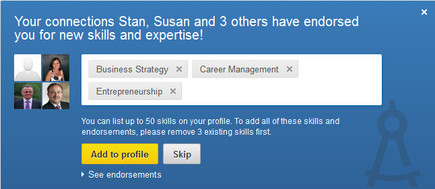 The article below was written when endorsements were launched last year. After a year of testing the results are in on Linkedin.com endorsements and connections. The new rule of Linkedin is connections over the magic 500 with lots of endorsements that those connections will help generate. You need 50 skills listed with 50+ endorsements for each skill? Why? Well Linkedin has an algorithm that measures the value of each skill by the number of votes it accrues in relationship to your job title. This data is then aggregated and sold to recruiters. Voila! It is easier for them to find profiles that fit the jobs they are trying to fill. What goes by the wayside? Well remember long time ago (like 3 years) when Linkedin told you to connect to only people you trust? But now it gives you connection suggestions of profiles and people that may you know because they know that you need many more connections to get a reasonable number of endorsements per skill listed regardless of trust. Out of 100 connections maybe ten people will bother to endorse your skills when your profile is offered up to them. Another way to get more endorsements is to endorse everybody presented to you to endorse whether you have any knowledge of their abilities or not. People tend to reciprocate in kind. Some have even thanked me. Why LinkedIn’s Endorsements are Awful But You Should Use Them Anyway By David Wolinsky | Wednesday, Oct 3, 2012 | Updated 8:18 AM CDT Linkedin's new feature makes the profile from hell. Have you logged into your LinkedIn account lately? You should. It’s okay. Go ahead. We’ll wait. Back? Okay. The site has been getting a major makeover lately, and the latest wrinkle is the ability to endorse your colleagues and contacts. This is separate from the personalized recommendations. This lets anyone who is on your LinkedIn list who may or may not have ever worked directly with you acknowledge one of your skills. This is incredibly stupid for a variety of reasons. But I’ll start off with the first sign that shows this wasn’t fully thought through: When you endorse someone’s skill, an individual skill, it shows up in all your contacts’ feeds for each skill. You think Davis is really great at “magazines,” “marketing,” and being “friendly?” Well, everyone know now knows that you think that about Davis: Because they get an individual update about each individual skill. That’s just sloppy for a social media site. No offense, Davis, but I don’t really care that Evan -- who I haven’t spoken with since last September -- thinks you excel at “magazines.” I don’t even know what that means, but it’s a real skill people I know have listed. The other main point is what I already sort of touched on. Recommendations are great because they’re personalized. These are just random fist bumps from your Rolodex. So why should you use it? Because it’s LinkedIn’s attempt to “gamify” its site, and it lets you better assess someone’s skill set. If a master at “magazines” thinks you’re great at “magazines,” then that can only be a good thing, or at least better than Eli Whatshisname appreciating your skill. It’s a shaky first step towards further enhancing LinkedIn, but it needs a little more time in the oven. David Wolinsky is a freelance writer and a lifelong Chicagoan. In addition to currently serving as an interviewer-writer for Adult Swim, he's also a comedy-writing instructor for Second City. He was the Chicago city editor for The Onion A.V. Club where he provided in-depth daily coverage of this city's bustling arts/entertainment scene for half a decade. When not playing video games for work he's thinking of dashing out to Chicago Diner, Pizano's, or Yummy Yummy. His first career aspirations were to be a game-show host. See original article here
0 Comments
Leave a Reply. |
Categories
All
Archives
May 2019
Licensed by CC-by-SA
|